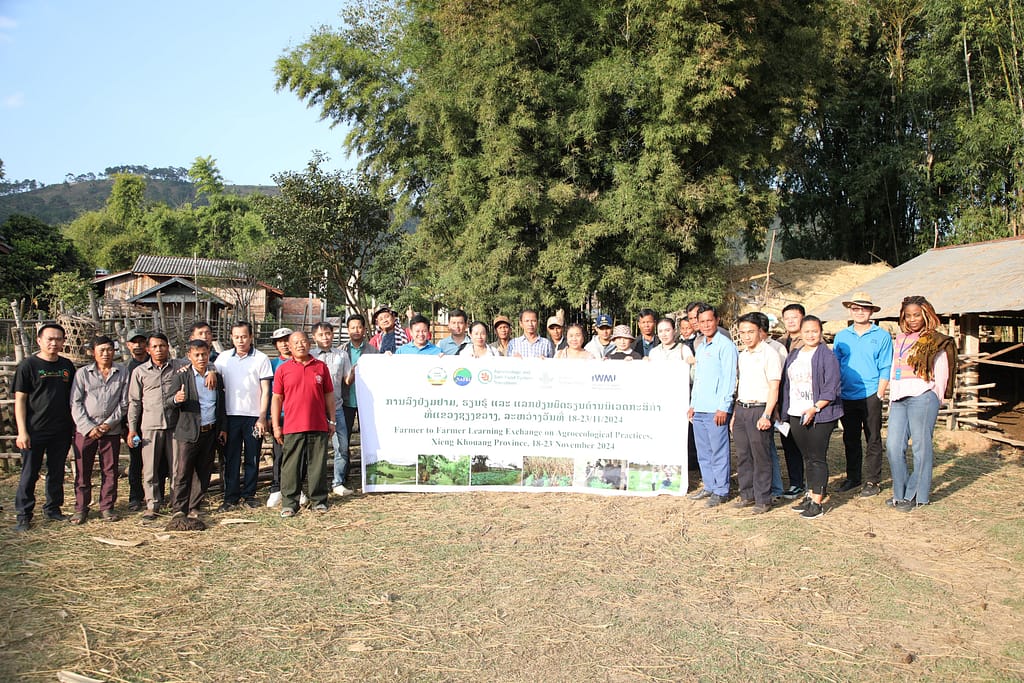By Pacem Kotchofa, Somphasith Douangsavanh, Souphalack Inphonephong, Viengxay Xaydala & Mark Dubois

To support a transition towards a more sustainable food system, the International Water Management Institute (IWMI) initiated farmer-to-farmer learning exchange visits as part of the CGIAR Initiative on Agroecology. The learning visits are organized in partnership with the Southern Provincial Agriculture and Forestry Office in Attapeu, the Agroecology and Safe Food System Transitions Project in the Northern Province of Xiengkhouang, under the auspices of the Department of Agricultural Land Management of the Ministry of Agriculture and Forestry.
These exchange visits cover several thematic areas, including agroecosystem-based approaches to better resource management in soil health, water and moisture conservation practices, crop diversification, fodder production for livestock, value chain systems, and market access through linking farmers to markets. These peer-induced learning field activities align with the country’s National Green Growth Strategy for 2030 by creating a safe environment that promotes knowledge extension and co-creation, capacity building, and dissemination of climate-resilient agricultural practices with various stakeholders.
The field trip experience
In November 2024, a group of farmers from the southern wetlands and northern mountainous regions exchanged tips and local knowledge on farming techniques, including agroforestry, intercropping, backyard poultry, cattle, beekeeping, rotational cropping, and integrated crop aquaculture, such as the Loum Pa system of rice and fish farming commonly practiced in Attapeu in the south and tea, coffee farms in Naxaydou in the north.
The group gathered around a field of mixed crops, including short-cycle rice, sweet corn, fruits, and coffee. The host farmer explained his innovative irrigation and cropping system: “It saves me time and water, and I harvest crops twice yearly. More importantly, it’s transformed how I manage my productions throughout the year.” K., a female farmer, commented “I think I can adapt this to my farm.” She then asked about the best ways to include beekeeping in farming practices.
Similar interactions occurred at S.’s ranch, where cattle were periodically kept in small, enclosed cages and grass-fed. B., a fellow male livestock keeper from Attapeu, mentioned during the plenary session that he was seeking ways to adapt these techniques to his herds as it would cut down transhumance time and allow him to collect manure directly for use in his crop farms.
Insights and impact
These exchanges were not only technical and instructive but also fun and friendly. Throughout the three days, farmers interacted casually through interactive on-farm and plenary discussions filled with laughter, jokes, foods and drinks, dance steps, and even karaoke songs, bringing them closer together. At the end of the trip, they all returned with several actionable insights and techniques that they were eager to try on both ends. The organization team also clarified that due to the significant geographical and climatic differences between the two regions, some technological transfers could be challenging and would call for their ability to adapt the newly acquired knowledge and farming practices in their respective farms with an open-minded approach.
They were reminded to constantly request technical assistance from local government entities and international agricultural organization partners, like IWMI researchers in Attapeu if they faced any challenges in adopting these practices. This is to reinforce our collaborative research and enable the co-creation of solutions to address their farming challenges. They were also encouraged to continue the discussions about these practices and share more tips through their various channels to foster resilient farmers and producer groups nationwide that enable each member’s growth. This includes, for instance, formalizing the legal basis of their various groups and associations to leverage their negotiating and bargaining power when signing market contracts with middlemen or requesting funding support to expand their activities. By decree, for the first time, agricultural producer groups have been officially established around the red rice trials in Attapeu. This milestone is one of the major highlights of IWMI’s coordinated actions supporting local governance and agricultural development through its Agroecology initiative.
Looking ahead
In sum, the spirit of collaboration and trusted partnership remained as the farmers left the northern farms, ranches, and beehives and returned to their respective flood plains, fields, and homes. For most of them, the trip was more than a mere visit—it was a chance to learn from each other, seek new opportunities, and forge a better path toward a more sustainable future through their daily farming activities. this mix of cultural and technical knowledge can reinforce and spur new, climate-friendly, agroecologically-driven, and market-oriented farming targets that can gradually help farmers achieve better production, nutrition, and livelihood opportunities in Lao PDR.
For X., a representative of Donephay village, the trip didn’t just increase his knowledge—it linked him and his farm with a new network of farmers with shared values for climate-friendly and agroecology-driven farming practices. X said, “We’ve already begun discussions about starting a collective irrigation project with a shared governance mechanism,” adding that “This trip is only the beginning of something bigger.”
















